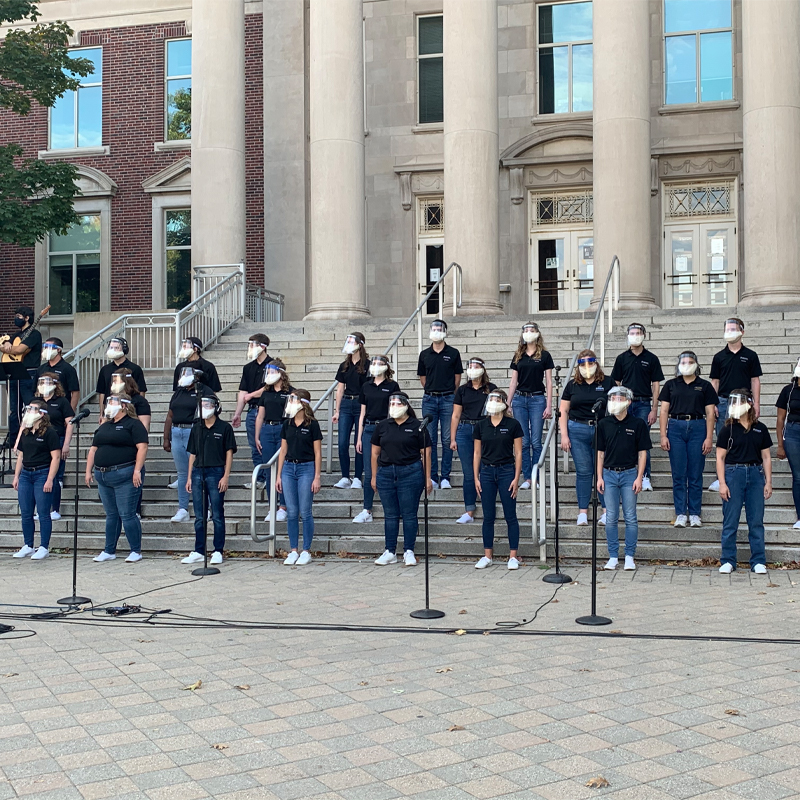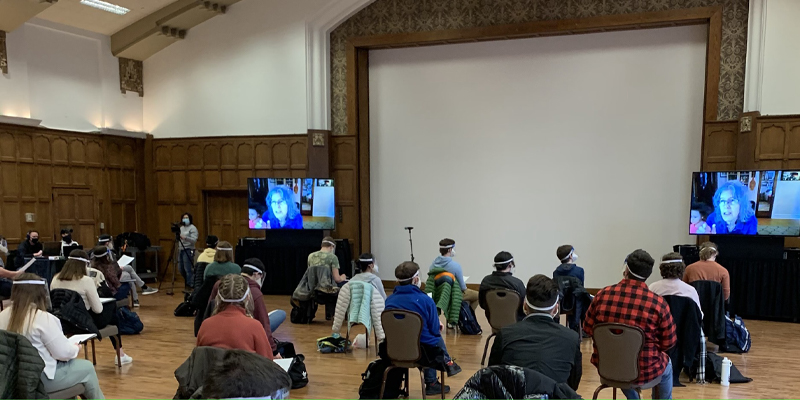Purdue Musical Organizations: Singing is Essential

Purdue Musical Organizations reimagined challenges brought forth by the COVID-19 pandemic to provide students in several ensembles the opportunity explore the relationships between music, global cultures and civic engagement this year.
Music and topics selected revolved around two themes – Singing as Civic Engagement, and Music in Global Perspectives. The idea to explore these topics was born out of challenges to traditional performance and instruction brought about by the COVID-19 pandemic. Jacob Stensberg, assistant director of Purduettes and University Choir, and director of All-Campus and Community Chorale and PMO Kids Choir, says it was important to engage with global topics and cultures that would be accessible in the virtual environment necessitated by the pandemic.
“I wanted to capitalize on that and, instead of just trying to have a normal year, I wanted to pick topics that would require the virtual medium to accomplish,” Stensberg says. “That made me think that we should be doing music that I couldn’t teach by myself and that I should be picking topics that I don’t know about so we can engage guest speakers from anywhere on the globe.”
During the fall semester, members of the Purduettes, University Choir and AllCampus and Community Chorale – a total of approximately 70 musicians – dove into the topic of Singing as Civic Engagement. The ensembles received cultural instruction from five guest speakers and worked with one guest conductor during a virtual music workshop. Discussion and musical instruction centered around four themes and pieces of music:
-
Singing and Public Health through “Ndandihleli,” a Xhosa (South African) folk song that has been adapted as an anti-apartheid anthem and used in relation to struggles against HIV/AIDS and the COVID-19 pandemic.
-
Singing and Women’s Rights through “What Happens When A Woman?” written by Artemisia, an a capella and body percussion song that serves to empower young women through the asking of questions about women in leadership positions.
-
Singing and Forced Migration through Sweet Honey in the Rock’s “Would You Harbor Me?”
-
Singing and Civil Rights through “Ella’s Song,” also written by Sweet Honey in the Rock, an all-woman, African-American a capella ensemble.
Guest speakers provided the cultural context for each piece of music. Mollie Stone of Village Harmony, an expert in South African choral music in the oral tradition, provided a DVD she produced in conjunction with singers in South Africa that was used to learn “Ndandihleli.” The musicians learned the music virtually, with the first rehearsal taking place over Zoom prior to in-person rehearsals. Juanita Crider, program advisor at the Black Cultural Center, gave a guest lectureaddressing social, political and sexual issues affecting women in connection with the Artemisia piece and continually updates a Spotify playlist with examples of songs featuring themes of women empowerment. PMO also partnered with Purdue Votes for assistance with registration and education on in-person and mail-in voting rules and procedures as part of its commitment to civic engagement.
One of the topics explored throughout the year was the question of whether music can be a catalyst for change in a society. André de Quadros, a music educator, conductor, ethnomusicologist and human rights activist who serves as a professor of music at Boston University shared his experiences through the lens of his work empowering people in incarcerated settings to tell their stories through music. Another perspective came from Jonathan Christopher, a member of the cast of Hamilton,who shared his experience with using music to remain politically active and raise money.
“The speaker series was great,” Stensberg says. “Normally, we’re a pretty closed unit at PMO in that our ensembles usually only work with us. We do occasionally have other people come in for a week and work for the choirs but, for the most part, we’re not typically working on five pieces of music and having five guest lecturers give hour-long presentations on the songs. Students reacted really positively and I hope it’s something we can keep doing."
During the spring semester, University Choir explored Music in Global Perspectives through the lenses of the Republic of Georgia and South Africa. In each instance, choir members received lessons on political, social, music, religious and cultural history from Stone and Patty Cuyler of Village Harmony, who served as experts on South African and Georgian music respectively. The unit on the Republic of Georgia included a private, two hour concert with Zedashe Ensemble, a cooking lesson, music lessons and supplemental geopolitical instruction. The exploration of South African music and culture included music lessons with multiple individuals and lessons specifically tied to apartheid, HIV/AIDS and COVID-19.
Learning about these cultures from culture bearers, Stensberg says, effects how students understand their own cultures and those of others in an authentic and impactful way. The networks students explored, stories of grit and resilience, and consideration of how music can impact well-being also connect strongly with the pillars of Steps to Leaps, a university-wide initiative.
“We want them to be more empathic,” Stensberg says. “We want them to have a more intense version of curiosity than they used to have and to be a little more sensitive to different cultural verbal and nonverbal communication styles. These are essential skills rooted in leadership.”
The program has been a success and hit with members of the participating ensembles. When surveyed, 98 percent of students responded that would like to see a continuation of similar programming in the future. More importantly, 100 percent of students agreed or strongly agreed that they have been encouraged to engage with and think about global cultures in new and different ways.
“I will remember the unlearning and learning that occurred simultaneously during these seminars,” one student wrote in their assessment. “We learned so much about the Black female experience through music, racism and combating it, songs of freedom, songs of love, songs of pain, and songs as political agents. I really loved this series so much and it showed a lot of initiative to revolutionize the way we think about singing, music and performances.”
Several pieces of music are rooted in oral tradition and have never been formally composed into sheet music. Choir members have expressed interest in similarly teaching the same pieces of music to incoming PMO students.
“That’s a sign that they totally understand how this music works, how it’s meant to work and how it’s worked for centuries,” Stensberg says. “To me, that’s a huge success.”
Stensberg and PMO are working with the Center for Intercultural Learning, Mentorship, Assessment and Research (CILMAR) to further assess the success of the program. Stensberg hopes a similar program next year can include a mix of virtual instruction and, if possible, spring break travel.

 .
.